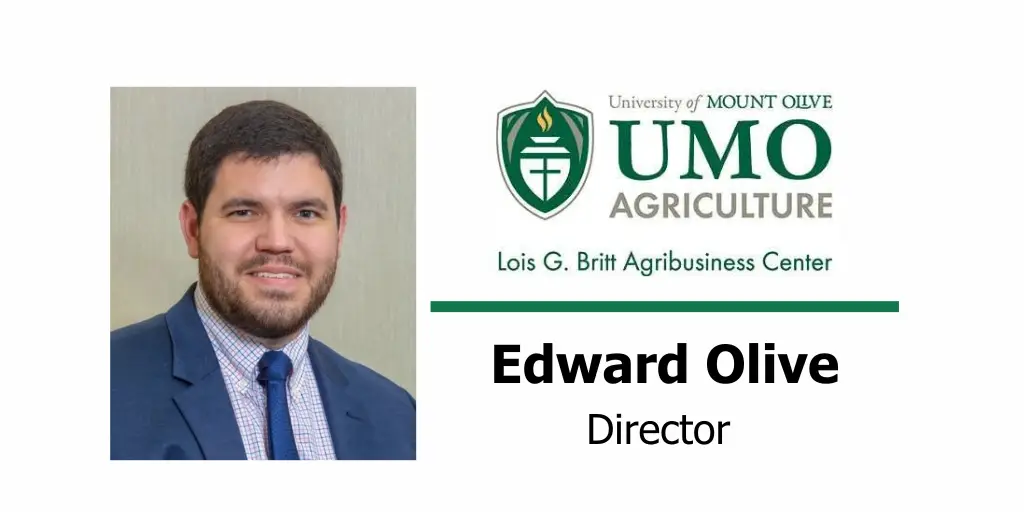Recently, Golden LEAF President, Chief Executive Officer Scott T. Hamilton sat down with Edward Olive, Director of the University of Mount Olive Lois G. Britt Agribusiness Center via Zoom and filmed an episode of Critical Conversations. In this series, Scott talks with professionals about economic development issues affecting the state.
Olive has served as the Director of the Lois G. Britt Agribusiness Center since 2019.
The Lois G. Britt Agribusiness Center was established at the University of Mount Olive in 2002 as a regional center for outreach and development to support the region’s agricultural community as well as agricultural academic programs at the university. The Agribusiness Center has secured over $3 million in grants to preserve farmland, offers cost-share funding to farm families in 33 North Carolina counties to diversify and expand agribusiness, and prepares the next generation of agricultural leaders.
Olive also served as an NC Ag Leads working group leader on the empower and equip the agriculture workforce group. He is the third Critical Conversations guest in 2025 focused on providing insight into the NC Ag Leads strategic planning process.
Olive shared that he first came to the University of Mount Olive in 2000 as a student. He was involved in outreach and events at the Agribusiness Center, and that experience set him on the path to a career in agriculture. Olive added that what started as an internship grew into a full-time role by 2012. Being both a former student and now director, said Olive, gave him a unique perspective on his role in preparing students for their futures.
The Lois G. Britt Agribusiness Center is so much more than a building. Olive said its role is to develop workforce opportunities, support students, and strengthen the agriculture community. He added that one of the most important components of the Agribusiness Center is to provide hands-on experiences. Students get both classroom experience and then they also get out into the field and apply what they’ve learned, Olive shared. Since the beginning of the Agribusiness Center, the focus has also been on providing training and outreach to farmers across the region. Part of the role of the Agribusiness Center is building strong programs and partnerships, Olive added, which help students find careers that allow them to remain in their home communities, in rural North Carolina. Olive said that he sees his role as bridging education and workforce needs. That means working with high schools, universities, agribusiness companies, and farmers to make sure that they are developing the next generation of leaders in agriculture.
The Golden LEAF has been a key partner in helping the University of Mount Olive expand agribusiness-focused facilities, Olive noted. The funding provided by Golden LEAF has allowed the university to provide students with more opportunities, whether through scholarships, internships, or applied learning experiences, shared Olive. Recent awards include a 2017 award to construct a building for classroom, lab, and meeting space at the university’s Kornegay Student Farm. In 2023, the Golden LEAF Board awarded funding to support development of the Shady Grove Educational Livestock Facility, a new livestock/forage training facility that will provide research and educational opportunities for college students and the greater agricultural community. These projects aim to build the talent, knowledge and skills needed for the future of agribusiness. Olive explained that students come from approximately 75 counties in the state to learn about agribusiness at the University of Mount Olive.
In his role as an NC Ag Leads working group leader on the empower and equip the agriculture workforce group, Olive said he worked alongside working group leader Vincent Ginski, Director of Workforce Competitiveness at the NC Chamber Foundation. Olive added that Ginski had a deep knowledge of workforce development strategies. Olive said his role was to provide insight into the workforce, specific to the agriculture sector. Together they worked with a network of people on the “focus of pursuing alignment among agricultural education efforts so that we have the best trained and most plentiful labor supply our system can produce.” He added that they looked at the full workforce pipeline including K-12, community colleges, and universities. They also had a group that focused on the employer side that included a spectrum of industries. The results of the sessions can be found in the NC Ag Leads strategic plan.
Learn more about the University of Mount Olive’s Lois G. Britt Agribusiness Center.

